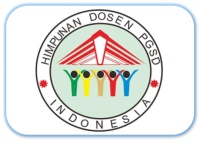Peningkatan Hasil Belajar Tematik Siswa Dengan Pendekatan Contextual Teaching and Learning (CTL) di Kelas 4 SDN 02 Percontohan Kota Bukittingi
Abstract
The purpose of this study is to improve students' thematic learning outcomes by using a contextual teaching and learning approach. Integrated thematic learning is learning that uses themes as the main focus. The learning provides meaningful experiences to students as a whole. Said to be meaningful because in integrated thematic learning students will understand the concepts they learn through direct and real experience. This research method, using classroom action research methods. The research procedure is in the form of a cycle Each cycle consists of three stages including: planning, implementing actions, observing, and reflecting. Data collection technique through observation and tests. This data collection uses instruments in the form of observation sheets of student and teacher observations in the learning process, whereas to determine the quality of student learning outcomes used evaluation / test sheets. The results of the study show that the use of contextual teaching and learning approaches can improve students' thematic integrated learning outcomes. From the average value in the first cycle, 72.22 became 94,4 the second cycle.
Keywords
References
Desyandri. (2012). The Usage of Contextual Teaching and Learning (CTL) Approach to improve the process and learning outcome of Singing to the Student Class III Elementary School YPKK of Padang State University. Pedagogi: Jurnal Ilmu Pendidikan, 12(1), 36–52. Retrieved from http://pedagogi.ppj.unp.ac.id/index.php/pedagogi/article/view/231
Yesya, D. P., Desyandri, & Yunisrul. (2018). Pengaruh Model Contextual Teaching and Leraning (CTL) Terhadap Hasil Belajar Siswa Sekolah Dasar. E-Journal Pembelajaran Inovasi, Jurnal Ilmiah Pendidikan Dasar, 6(1), 1–10. Retrieved from http://ejournal.unp.ac.id/students/index.php/pgsd/article/view/3907/2486
Hamzah Uno.(2018).Teori Motivasi & Pengukurannya: Analisis di Bidang Pendidikan. Jakarta:Bumi Aksara.
Kemendikbud. 2013. Panduan Teknis Pembelajaran Tematik Terpadu dengan Pendekatan ctl di Sekolah Dasar. Kementerian Pendidikan dan Kebudayan. Jakarta: Kemendikbud
Kunandar. 2008. Langkah Mudah Penelitian Tindakan Kelas. Rajawali Pers: Jakarta
Majid, Abdul. 2014. Pembelajaran Tematik Terpadu. PT. Remaja Rosdakarya: Bandung
Miaz, Yalvema. 2014. Penelitian Tindakan Kelas Guru dan Dosen : UNP. Press Padang
Rofiq, Nafiur. 2011. Pembelajaran Kooperatif (Cooperative Learning) dalam Pengajaran Pendidikan Agama Islam. Jurnal Falasifa
Rusman. 2014. Model-model Pembelajaran: Mengembangkan Profesionalisme Guru. Jakarta: Rajawali Pers
Sugiyono. 2011. Metode Penelitian Kuantitatif, Kualitatif dan R&D. Bandung: Alfabeta
Suharsimi Arikunto. 2006. Penelitian Tindakan Kelas. Jakarta: Bumi Aksara.
Trianto. 2009 . Mendesain Model Pembelajaran Inovatif Progresif Konsep,Landasan, dan Implementasinya pada Kurikulum Tingkat Satuan Pendidikan. Jakarta : Kencana
V.Wiratna. 2014. MetodologiPenelitian Lengkap, Praktis, dan Mudah Dipahami. Yogyakarta : Pustaka Baru
DOI: http://dx.doi.org/10.24036/e-jipsd.v7i12.7432


